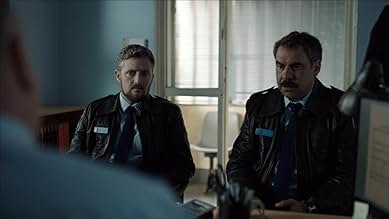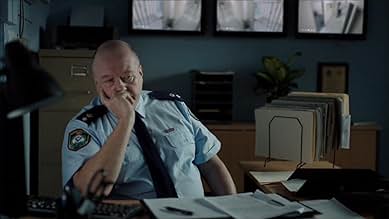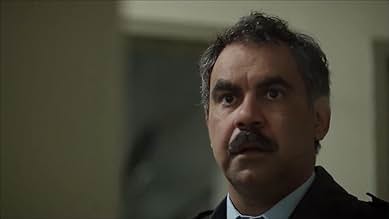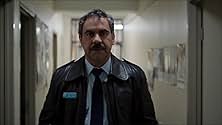Ajouter une intrigue dans votre langueThe troubled lives of struggling indigenous Australians in the tough, rundown neighborhood of the inner suburb of Redfern in Sydney.The troubled lives of struggling indigenous Australians in the tough, rundown neighborhood of the inner suburb of Redfern in Sydney.The troubled lives of struggling indigenous Australians in the tough, rundown neighborhood of the inner suburb of Redfern in Sydney.
- Récompenses
- 16 victoires et 16 nominations au total
Parcourir les épisodes
Avis à la une
Some Aussie shows, I take like a duck to water. Redfern Now is one of those shows. It's extremely well acted, especially the last one I saw, involving family rape, where the Aunt who copped it after the daughter, was so believable, in the wake of her ordeal, her horror aftermath, thanks to serial rapist (Hayes). The players are mostly an unknown cast of indigenous folk, but what a great pool of talent. They're all so good, where I really like Wayne Blair's cop character, especially in the last one, trying hard to let his personal opinions get in the way. In my opinion, this great acting stature all deserve recognition. I've never seen such high acting calibre from black folk. These are the people budding acting students need as tutors. The first episode I ever caught, involved a homosexual black, where his lover, was on a life support, and Noni Hazelhurst was the mother, again excellent of course, where she didn't want the plug pulled, and after it was, it created such major conflict, and a claustrophobic atmosphere between the warring parties, with such ferocity in Noni's character, drawing similarities to her A Place To Call Home, not her character, but intentions. It was kind of freaky. The latest episode I saw- the rape one, was really smart in how it manipulated the viewer, to it's conclusion, letting us think the worst. Redfern Now isn't just a good show, it's real life, and like real life, things can get ugly. Redfern Now, is a show, you must watch now. If you didn't know, Redfern is an inner city suburb, of Sydney, the west neighboring suburb of Surry Hills. You should visit it sometime.
This series is refreshingly different to all the formulaic cop shows/hospital dramas/sitcoms which dominate the TV landscape. The episodes deal with everyday issues in a realistic fashion; we are privileged to see some of Australia's best actors at work; and indigenous people are portrayed non-stereotypically. Not all the story lines are resolved neatly - just like real life, things sometimes turn out other than we would wish. Each episode is self-contained, but many characters appear in several eps with differing degrees of prominence, so someone who features in one episode as the protagonist may pop up later in a supporting role. If you like intelligent, thoughtful and thought-provoking drama, and you are an open-minded discerning viewer, I think you will find Redfern Now a rewarding experience.
Redfern Now is not a procedural. It is not about indigenous vs white Australia. It isn't a series, nor is it entirely episodic.
Redfern Now confused me for a while; its format is different and sometimes challenging. Characters get developed to a certain point and then disappear (although they sometimes then reappear).
Redfern Now is the filmed equivalent of an anthology. These are short stories, compellingly told. The nature of the short story is that it forces us to engage, and care, quickly...and then move to resolution with equal pace and force - the exact opposite of lots of other quality TV - Breaking Bad, Mad Men - which have taught us that the super- long format of TV offers the generosity of time to develop stories and characters.
Yes, it sometimes employs what we recognise as clichés. That's because clichés are sometimes real, and they are always recognisable and immediate devices - pretty handy in the short story format.
The highlight of Redfern Now is the writing. Any story-teller would be proud of the way dialogue is captured here - real, witty, succinct and punctuated with telling silences.
For me, the acting can sometimes be Redfern Now's weak link. The theatre background of some of the actors sometimes makes their performances a little 'big' for the small screen. On the other hand, some performances are extraordinary, with heart, emotion and humour played out simply and beautifully.
There are lots of 'issues' in Redfern Now that signal its roots in urban Aboriginal community and culture, but many of the stories could be about contemporary Australia in any suburb. The challenges of 'belonging' in a multicultural community, where family relationships are changing, where mobility up and down the socio-economic ladder is more slippery than ever, where our notion of identity is challenged, and where the connection between past and future seems stretched to breaking point are challenges we all face. These stories have resonance well outside of not just the Redfern Aboriginal community, but outside the indigenous community entirely.
Each of the six programs (for they aren't really episodes) in the two series produced so far, have clearly been laboured over. The investment of time, skill, love and commitment shines through in a very unique way.
These are showcases of tremendous writing, beautiful production and staging, and generally great acting - from both indigenous and other actors. Redfern Now could easily become a hothouse for the next generation of Australian film and TV stars, on both sides of the camera.
Redfern Now confused me for a while; its format is different and sometimes challenging. Characters get developed to a certain point and then disappear (although they sometimes then reappear).
Redfern Now is the filmed equivalent of an anthology. These are short stories, compellingly told. The nature of the short story is that it forces us to engage, and care, quickly...and then move to resolution with equal pace and force - the exact opposite of lots of other quality TV - Breaking Bad, Mad Men - which have taught us that the super- long format of TV offers the generosity of time to develop stories and characters.
Yes, it sometimes employs what we recognise as clichés. That's because clichés are sometimes real, and they are always recognisable and immediate devices - pretty handy in the short story format.
The highlight of Redfern Now is the writing. Any story-teller would be proud of the way dialogue is captured here - real, witty, succinct and punctuated with telling silences.
For me, the acting can sometimes be Redfern Now's weak link. The theatre background of some of the actors sometimes makes their performances a little 'big' for the small screen. On the other hand, some performances are extraordinary, with heart, emotion and humour played out simply and beautifully.
There are lots of 'issues' in Redfern Now that signal its roots in urban Aboriginal community and culture, but many of the stories could be about contemporary Australia in any suburb. The challenges of 'belonging' in a multicultural community, where family relationships are changing, where mobility up and down the socio-economic ladder is more slippery than ever, where our notion of identity is challenged, and where the connection between past and future seems stretched to breaking point are challenges we all face. These stories have resonance well outside of not just the Redfern Aboriginal community, but outside the indigenous community entirely.
Each of the six programs (for they aren't really episodes) in the two series produced so far, have clearly been laboured over. The investment of time, skill, love and commitment shines through in a very unique way.
These are showcases of tremendous writing, beautiful production and staging, and generally great acting - from both indigenous and other actors. Redfern Now could easily become a hothouse for the next generation of Australian film and TV stars, on both sides of the camera.
Maybe one has to be Australian to like this series. But not for anyone who has experienced well executed drama. Having ploughed through 6 of the episodes picked from both series 1 and 2 we won't be watching any more. The basic messages are clearly well intentioned but the dialogue is simple and the scenes so repetitive we kept shouting "OK we've got the message".
The characters have little depth and the endings are mostly predictable after about 10 minutes. If this is the kind of drama that wins awards in Australia, then it is no wonder why the rest of the world views that part of the world as lacking culture. (Just as well the Sydney Opera house can counter that.)
The underlying story is generally good but just doesn't justify 50 minute episodes. Now weave several episodes together giving each story maybe 20 minutes air time and there just could be an interesting poignant mini series.
The characters have little depth and the endings are mostly predictable after about 10 minutes. If this is the kind of drama that wins awards in Australia, then it is no wonder why the rest of the world views that part of the world as lacking culture. (Just as well the Sydney Opera house can counter that.)
The underlying story is generally good but just doesn't justify 50 minute episodes. Now weave several episodes together giving each story maybe 20 minutes air time and there just could be an interesting poignant mini series.
Badlandz didn't know what he was talking about. If he knew it's actually worse because oh yea we need another American to comment on the intricate and complicated societal Australian problems that were brilliantly reflected and acted in the series. I love the dialog, the emotional weight between the silences, the pauses, which is distinctly Australian; while some might prefer a 50 min drama filled with clever non- clichéd witty dialogue with Tom-Cruise-facial-contortion-style of acting, normally people don't act this way and I think it's the show's purpose to honestly and realistically portray the multi-facets of contemporary Aboriginal lives in Australia.
Le saviez-vous
- AnecdotesDeborah Mailman was nominated for a 2015 Australian Academy of Cinema and Television Arts Award in the Best Lead Actress in a Television Drama category for her role as Lorraine in Redfern Now (2012).
- ConnexionsReferenced in The Making of Emu Runner (2018)
Meilleurs choix
Connectez-vous pour évaluer et suivre la liste de favoris afin de recevoir des recommandations personnalisées
- How many seasons does Redfern Now have?Alimenté par Alexa
Détails
Contribuer à cette page
Suggérer une modification ou ajouter du contenu manquant



























